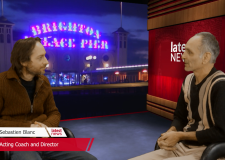Vanessa Austin Locke: Strange Fruit
Someone asked me the other day what my ‘crutch’ is. Apparently everyone has a ‘crutch’, something they lean on when times are tough. The obvious ones are cigarettes, drugs, alcohol and other people I suppose, but there are also less destructive ones like yoga or shopping. I hate shopping, and I’m done with my yoga phase for now. I smoked the odd cigarette when I was younger but it didn’t suit me, and if I drink too much I just fall asleep. I was about to say that I honestly didn’t feel like I had a crutch, and then I realised there was something, or rather someone, that I consistently turn to when life delivers a big, juicy sucker punch. Nina Simone.

I’d love to say that Nina has been with me since I was a child, but I found her in my early 20s, in the living room of a disgustingly charming Frenchman, as I lay swathed in nag champa and co-dependence. I’ve discovered that the things we need find us at the right time, when we’re ready to learn from them.
“Even Nina Simone’s weakness was stronger than I had been in my strongest moments”
It was like that with Nina, ever the chain-breaker, she sang of such pain, sorrow and heartache, but never, NEVER, without power. Even her weakness was stronger than I had been in my strongest moments. And so, across oceans, and cultures, and generations, this woman, with whom I had nothing in common, aside from a tiny little thing they call The Human Experience, grew me up.
It was because of Nina that I learned about slavery, segregation and the Civil Rights Movement outside of its historical context, and really felt it in my gut and prickling behind my eyes. It was because of Nina that I discovered a concept of God that reached outside of churches or synagogues, or what human tongues told me God was. And it was because of Nina that I found the inherent and indomitable strength that lies just the other side of weakness.
I’d been wondering why no biopic had been realised depicting the life of Nina Simone, when I learned of Cynthia Mort’s attempt to bring her to the silver screen in 2013. The film has yet to be released because of controversy over the choice of lead actress. Mary J Blige was set to play The High Priestess of Soul but the part eventually went to Zoe Saldana. Simone’s estate expressed dissatisfaction with the choice because the actress lacks any real resemblance to Simone, and they’re right. But why is that important when we can do such wonders with prosthetics and in post-production?
Well, it’s important because black women are often only promoted by Hollywood if they have ‘white’ features. As Simone’s own daughter Simone Kelly said, “my mother was raised at a time when she was told her nose was too wide, her skin was too dark.” To ignore some of the very reasons Nina became the activist and powerhouse she still is today is to disrespect everything she stood for and bend over to a Hollywood that is still obsessed with looks above content.
I’ve no doubt that Zoe Saldana is a fine actress and could do the job marvellously, but why not chose someone with at least a nod to the looks Simone was berated for? There are plenty out there who are passed over, or only cast as the mammy, or the slave, or the underprivileged kid. Here’s a chance for someone to play a character with some really positive identity and Hollywood should surely be supporting that as part of an on-going reparation that we all owe to each other. ”
Follow me: @vnessenvy





















